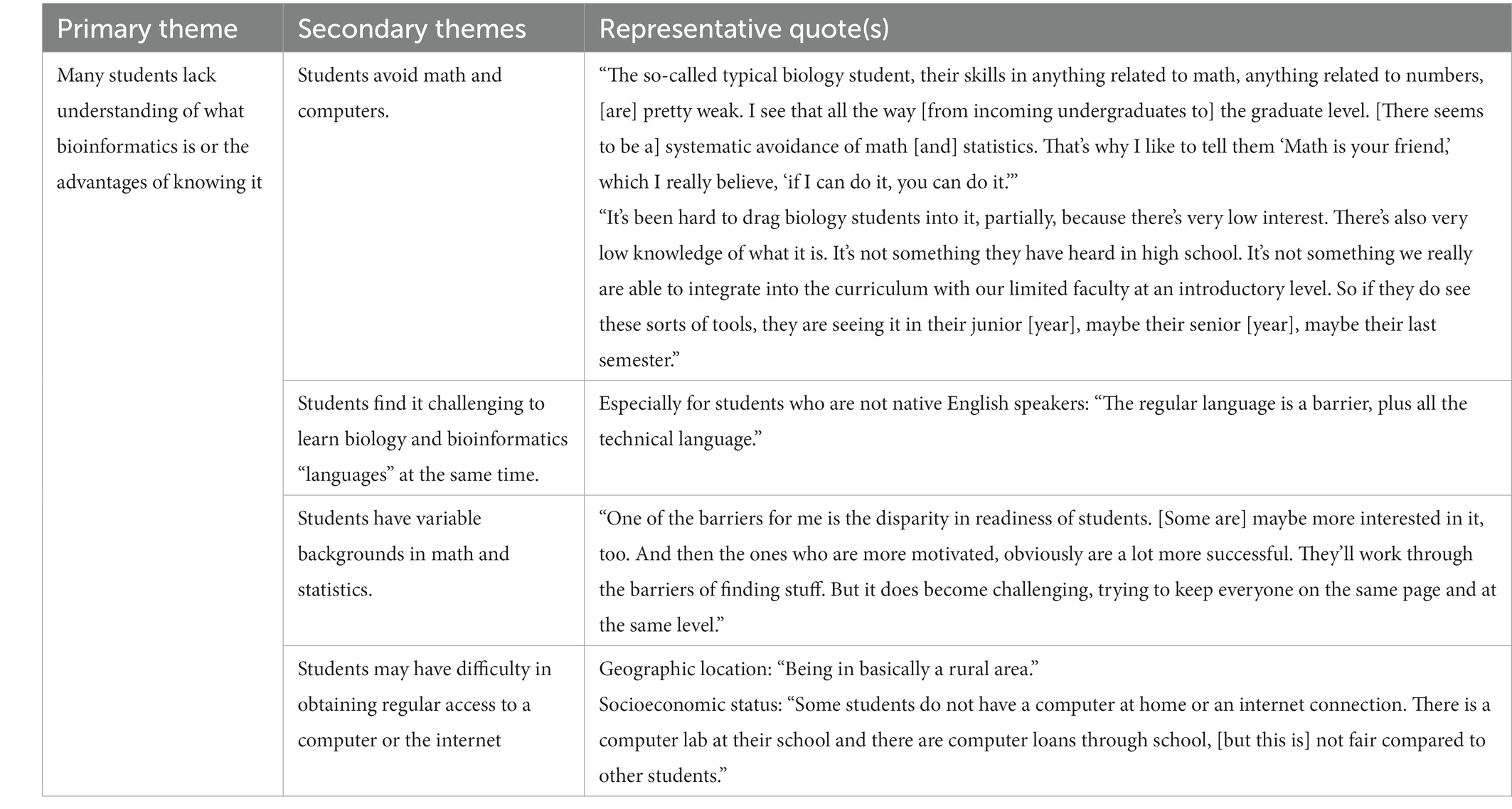The Main Principles Of Bioinformatics Tutor
The Main Principles Of Bioinformatics Tutor
Blog Article
The Best Guide To Bioinformatics Tutor
Table of ContentsBioinformatics Tutor - QuestionsFascination About Bioinformatics TutorWhat Does Bioinformatics Tutor Do?The Definitive Guide for Bioinformatics TutorAn Unbiased View of Bioinformatics Tutor
First project growth is rather time-consuming, as it entails careful planning of the subject, structuring of deliverables, and consideration of the skills and experience levels of individuals. Nonetheless, when a task has actually been clearly specified and implemented, it has the possible to be recycled in future sessions with only minor modifications to mirror updates in the field or fit distinctions in participant backgrounds. This makes project-based learning a effective and lasting mentor approach over time, especially in quickly progressing disciplines like bioinformatics.To guarantee continuity and reproducibility of understanding, providing shared lab notebooks-- either physical or electronic-- is essential. These notebooks function as joint logs where pupils can tape their development, code, methodologies, and results throughout the program. Not just do they enhance discovering by motivating paperwork and reflection, yet they also act as post-course referral products that participants can speak with in future research or academic tasks.
Advisors play an essential duty in the success of project-based programs. Mentors likewise act as role designs and inspire students to proceed pursuing jobs in computational biology and associated areas.
The Greatest Guide To Bioinformatics Tutor
Another key element of the knowing procedure is giving participants the opportunity to provide their work to others, specifically to an audience beyond their instant task team. Last discussions or mini-conferences allow trainees to express their searchings for, receive constructive comments, and gain confidence in interacting scientific material. This presentation element is commonly a favorite among students, as it verifies their efforts and highlights the real-world significance of their work.
Each iteration of the program was fine-tuned based on individual responses and advancing finest practices in rearing. Bioinformatics Tutor. These adjustments made sure that the core objectives-- hands-on learning, cooperation, and applied problem-solving-- remained undamaged while broadening the depth and breadth of subjects covered.
A significant visualization that captured participant view was a word cloud produced from reactions to the 2014 end-of-course study. Individuals were asked, "What was the finest component of the training course?" and their actions were compiled right into a graphical word cloud. In this depiction, the dimension of each word indicates just how regularly it was pointed out, with words like "hands-on," "collaboration," "real-life troubles," "assistance," and "interactive" showing up most plainly. This visual feedback enhanced the program's emphasis on experiential understanding and coach assistance.
The contributions of individuals such as Rustici, G., Orchard, S., Cowley, A., and Twells, R., in addition to other participants of the EBI user-training-working group, were critical in refining the program framework and material. Their insights assisted form a flexible and inclusive model that can be adapted to different institutional and local contexts.
Not known Factual Statements About Bioinformatics Tutor

Jones, Rasmussen, and Moffitt (1997) additionally promoted visit for interdisciplinary learning with collaborative job job, noting its ability to replicate professional atmospheres and prepare students for future scholastic or industry functions. In a thorough review, Thomas (2000) assessed multiple research studies on PBL and concluded that pupils not just carry out well academically however additionally develop a deeper understanding of the subject issue and enhanced team effort abilities.
In the context of bioinformatics education, ingenious methods like class games and simulation-based training have actually additionally been employed. Schneider and Jimenez (2013) presented the usage of interactive video games to teach biological data integration, allowing pupils to grasp complex concepts through experiential knowing. This type of gamification matches the hands-on understanding highlighted in project-based programs by presenting an aspect of fun and competition, which can even more enhance interaction.
Going back to the training course reviewed below, the lessons gained from the execution of project-based understanding in a bioinformatics establishing have broader ramifications for other STEM areas. The technique stresses not simply technical proficiency, yet additionally interaction, cooperation, and essential reasoning-- skills that are progressively valued in both academic community and sector.
The Basic Principles Of Bioinformatics Tutor
The scalability of the program format additionally makes it a practical version for various other establishments. With suitable modification based on neighborhood needs, readily available resources, and participant accounts, the framework can be duplicated or adjusted for use in various other scientific domains. In addition, the inclusion of organized mentorship and analysis techniques helps make sure regular top quality and measurable understanding outcomes.

To conclude, project-based learning in bioinformatics uses a powerful strategy to teaching complicated, interdisciplinary web content in such a way that is both obtainable and intellectually stimulating. By emphasizing partnership, sensible application, and vital questions, such campaigns not only enhance private understanding however additionally add to the cultivation of a new generation of innovative and proficient scientists.
How Bioinformatics Tutor can Save You Time, Stress, and Money.

Another trick aspect of the knowing process is supplying individuals the possibility to offer their job to others, specifically to click for more info a target market beyond their instant job group.In the broader educational literature, project-based knowing (PBL) has been extensively researched and validated as an efficient technique for promoting deep understanding, vital thinking, and transferable skills. Adderley et al. (1975) emphasized the value of task methods in greater education and learning, keeping in mind that they advertise active knowing and autonomy. Schneider and Jimenez (2013) presented the usage of interactive video games to educate organic data integration, enabling pupils to realize complicated ideas through experiential knowing.
Report this page